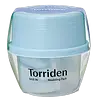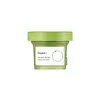What's inside
What's inside
 Key Ingredients
Key Ingredients

 Benefits
Benefits

 Concerns
Concerns

 Ingredients Side-by-side
Ingredients Side-by-side

Diatomaceous Earth
AbrasiveGlucose
HumectantAlgin
MaskingKaolin
AbrasiveCI 77231
Cosmetic ColorantXanthan Gum
EmulsifyingZea Mays Starch
AbsorbentCellulose Gum
Emulsion StabilisingTrehalose
HumectantBetaine
HumectantXylitol
HumectantHyaluronic Acid
HumectantSodium Hyaluronate
HumectantPotassium Hyaluronate
Skin ConditioningHydroxypropyltrimonium Hyaluronate
Hydrolyzed Sodium Hyaluronate
Skin ConditioningPanthenol
Skin ConditioningAllantoin
Skin ConditioningPotassium Alginate
Emulsion StabilisingSodium Dehydroacetate
PreservativeDextrin
AbsorbentTetrasodium Pyrophosphate
BufferingWater
Skin ConditioningGlycerin
Humectant1,2-Hexanediol
Skin ConditioningUndaria Pinnatifida Extract
Skin ConditioningGardenia Florida Fruit Extract
Skin ConditioningDiatomaceous Earth, Glucose, Algin, Kaolin, CI 77231, Xanthan Gum, Zea Mays Starch, Cellulose Gum, Trehalose, Betaine, Xylitol, Hyaluronic Acid, Sodium Hyaluronate, Potassium Hyaluronate, Hydroxypropyltrimonium Hyaluronate, Hydrolyzed Sodium Hyaluronate, Panthenol, Allantoin, Potassium Alginate, Sodium Dehydroacetate, Dextrin, Tetrasodium Pyrophosphate, Water, Glycerin, 1,2-Hexanediol, Undaria Pinnatifida Extract, Gardenia Florida Fruit Extract
Water
Skin ConditioningVigna Radiata Seed Extract 11%
Skin ConditioningGlycerin
HumectantKaolin
AbrasiveBentonite
AbsorbentDiglycerin
HumectantZea Mays Starch
AbsorbentPropanediol
Solvent1,2-Hexanediol
Skin ConditioningGlyceryl Glucoside
HumectantBetaine
HumectantDipropylene Glycol
HumectantPhaseolus Radiatus Seed Powder 0.6%
Calamine
AbsorbentPotassium Cetyl Phosphate
EmulsifyingXanthan Gum
EmulsifyingHydroxyacetophenone
AntioxidantCocos Nucifera Shell Powder
AbrasiveEthylhexylglycerin
Skin ConditioningNiacinamide
SmoothingPhaseolus Radiatus Seed Extract 0.1%
Skin ConditioningPhaseolus Radiatus Extract 0.1%
Skin ConditioningOlea Europaea Fruit Oil
MaskingSodium Acrylate/Sodium Acryloyldimethyl Taurate Copolymer
Emulsion StabilisingChlorella Vulgaris Powder
Skin ConditioningPolyisobutene
Glucose
HumectantTriethoxycaprylylsilane
Disodium EDTA
Butylene Glycol
HumectantCitric Acid
BufferingAllantoin
Skin ConditioningSorbitan Oleate
EmulsifyingCaprylyl/Capryl Glucoside
CleansingAbies Sibirica Oil
MaskingRosmarinus Officinalis Leaf Oil
MaskingSalvia Sclarea Oil
MaskingPhaseolus Radiatus Sprout Extract
HumectantAnthemis Nobilis Flower Oil
MaskingHydrolyzed Extensin
Skin ConditioningJuniperus Mexicana Oil
MaskingCanadian Colloidal Clay
Skin ConditioningManicouagan Clay
AbsorbentIllite
AbrasiveChamomilla Recutita Flower Oil
MaskingMontmorillonite
AbsorbentProtease
ExfoliatingWater, Vigna Radiata Seed Extract 11%, Glycerin, Kaolin, Bentonite, Diglycerin, Zea Mays Starch, Propanediol, 1,2-Hexanediol, Glyceryl Glucoside, Betaine, Dipropylene Glycol, Phaseolus Radiatus Seed Powder 0.6%, Calamine, Potassium Cetyl Phosphate, Xanthan Gum, Hydroxyacetophenone, Cocos Nucifera Shell Powder, Ethylhexylglycerin, Niacinamide, Phaseolus Radiatus Seed Extract 0.1%, Phaseolus Radiatus Extract 0.1%, Olea Europaea Fruit Oil, Sodium Acrylate/Sodium Acryloyldimethyl Taurate Copolymer, Chlorella Vulgaris Powder, Polyisobutene, Glucose, Triethoxycaprylylsilane, Disodium EDTA, Butylene Glycol, Citric Acid, Allantoin, Sorbitan Oleate, Caprylyl/Capryl Glucoside, Abies Sibirica Oil, Rosmarinus Officinalis Leaf Oil, Salvia Sclarea Oil, Phaseolus Radiatus Sprout Extract, Anthemis Nobilis Flower Oil, Hydrolyzed Extensin, Juniperus Mexicana Oil, Canadian Colloidal Clay, Manicouagan Clay, Illite, Chamomilla Recutita Flower Oil, Montmorillonite, Protease
 Reviews
Reviews

Ingredients Explained
These ingredients are found in both products.
Ingredients higher up in an ingredient list are typically present in a larger amount.
1,2-Hexanediol is a synthetic liquid and another multi-functional powerhouse.
It is a:
- Humectant, drawing moisture into the skin
- Emollient, helping to soften skin
- Solvent, dispersing and stabilizing formulas
- Preservative booster, enhancing the antimicrobial activity of other preservatives
Allantoin is a soothing ingredient known for its protective and moisturizingg properties. Because of this, it is often added to products with strong active ingredients.
Studies show higher concentrations of this ingredient can promote wound healing.
Though it can be derived from the comfrey plant, allantoin is produced synthetically for cosmetic products to ensure purity.
Learn more about AllantoinBetaine is a common humectant (a substance that promotes retention of moisture). It's known to be gentle on the skin and can help balance hydration.
This ingredient is best for improving hydration and soothing irritated skin. Studies also show it helps even out skin tone.
Fun fact: Betaine is naturally created in the skin and body. The kind found within cosmetic products can be either plant-derived or synthetic.
Another name for betaine is trimethylglycine.
Learn more about BetaineGlucose is a simple sugar and is the most important source of energy in all organisms.
In skincare, glucose is used to hydrate the skin. It also acts as a prebiotic for our natural biome.
Glucose is hydrating due to its humectant property. As a humectant, glucose draws moisture from the air and from deeper levels in the skin.
Our skin contains many sugars that act as prebiotics and help strengthen our natural microbiome. Having a healthy microbiome helps protect our skin from harmful bacteria and other contaminants.
Studies show glucose may help with fading discoloration and pigmentation. This is because our skin metabolizes glucose into lactic acid. Lactic acid is an AHA that helps exfoliate the top layer of skin.
Learn more about GlucoseGlycerin is already naturally found in your skin. It helps moisturize and protect your skin.
A study from 2016 found glycerin to be more effective as a humectant than AHAs and hyaluronic acid.
As a humectant, it helps the skin stay hydrated by pulling moisture to your skin. The low molecular weight of glycerin allows it to pull moisture into the deeper layers of your skin.
Hydrated skin improves your skin barrier; Your skin barrier helps protect against irritants and bacteria.
Glycerin has also been found to have antimicrobial and antiviral properties. Due to these properties, glycerin is often used in wound and burn treatments.
In cosmetics, glycerin is usually derived from plants such as soybean or palm. However, it can also be sourced from animals, such as tallow or animal fat.
This ingredient is organic, colorless, odorless, and non-toxic.
Glycerin is the name for this ingredient in American English. British English uses Glycerol/Glycerine.
Learn more about GlycerinKaolin is a clay. It is used for oil control and to help minimize pores. Like other clays, kaolin has the ability to absorb excess sebum or oil. This can help clean out pores and mattify the skin.
Some types of kaolin may have exfoliating properties. When water is added to kaolin, it becomes a paste with small abrasive particles.
Most kaolin is a white color, but may be pink/orange/red depending on where it comes from.
The name 'kaolin' comes from a Chinese village named 'Gaoling'. Kaolin clay comes from rocks rich in kaolinite. Kaolinite, the mineral, has a silicate layered structure. Kaolinite is formed from chemical weathering of aluminum siilicate minerals.
Besides skincare, kaolin is commonly used to make glossy paper, in ceramics, toothpaste, and as medicine to soothe stomach issues.
Learn more about KaolinWater. It's the most common cosmetic ingredient of all. You'll usually see it at the top of ingredient lists, meaning that it makes up the largest part of the product.
So why is it so popular? Water most often acts as a solvent - this means that it helps dissolve other ingredients into the formulation.
You'll also recognize water as that liquid we all need to stay alive. If you see this, drink a glass of water. Stay hydrated!
Learn more about WaterXanthan gum is used as a stabilizer and thickener within cosmetic products. It helps give products a sticky, thick feeling - preventing them from being too runny.
On the technical side of things, xanthan gum is a polysaccharide - a combination consisting of multiple sugar molecules bonded together.
Xanthan gum is a pretty common and great ingredient. It is a natural, non-toxic, non-irritating ingredient that is also commonly used in food products.
Learn more about Xanthan GumZea Mays Starch is starch made from corn. You might know this as cornstarch . It is used to thicken a product. It can replace talc as an absorbent.
The pH of cornstarch is 5.92.
Cornstarch is a common food ingredient used to thicken soups or to make corn syrup.
Learn more about Zea Mays Starch